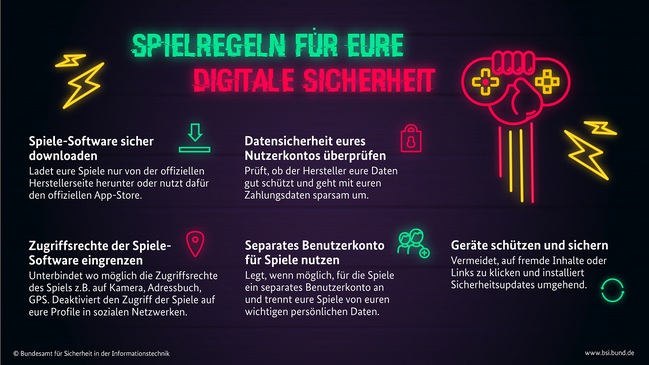Online gaming: playing rules for digital security
What should you look out for in terms of gaming security?
Red Dead Redemption, Fortnite, Days Gone and Forza are some of the most popular video games from recent years. Gaming fans should pay attention to a few important playing rules to make sure the game stays fun and doesn't become a danger.

There are plenty of video games on the market for every conceivable target group, including racing, shooting or strategy games. Commuters spend just as much time playing on their smartphones as professional gamers. Online games and mobile games for smartphones and tablets are especially popular. It is not uncommon for those who choose to play these games to invest a lot of money and even more time.
A recent survey conducted by the BSI and the State and Federal Police Crime Prevention Commission (ProPK) shows that 39 per cent of respondents who own a game console use it weekly and 22 per cent even play daily. These figures don't yet take into account games for smartphones, tablets, computers or smart TVs.
However, all online gamers face the same threats. The storylines and game characters means users forget to practice caution, while at the same time computers, game consoles and mobile devices are connected to each other. Accounts with insufficient security safeguards, poorly protected servers or manipulated pirated copies then shift the focus of scammers and criminals to certain video games. The consequences range from data loss and account blocking to financial loss.
Security technologies and the careful handling of data must be made a priority in the world of gaming in the future to ensure that gaming stays fun and isn't ruined by careless actions. Watch our BSI experts summarise what this actually involves in the following video:
How can I protect myself?
So you can hopefully avoid the consequences of cyber attacks in the first instance, we have put together some tips for you that can easily be put into practice:
- Secure source: only download games from official sources. These sources include the app stores of smartphone manufacturers or well-known software companies that work together with the developers. If you don't know the source or if the game has been illegally downloaded, you should not install it. Indications that an online source is dubious could be a price that is much lower than everywhere else or a missing legal notice.
- Account protection: only create an account if you are absolutely certain that your data will be processed confidentially and made secure with suitable encryption technology by the provider. In particular, you should only disclose your credit card information in specific cases and once you have carefully considered why you need to enter the information. It is advised that you avoid links to social media altogether. In addition, it is important to adhere to recommendations for secure and complex passwords.
- In-app purchases: lots of games offer digital upgrades that are not included in the original purchase price. So you don't accidentally get caught out by this money trap, secure in-app purchases with a password. This will also help you avoid unintentional purchases being made, e.g. by your children, which can rack up high costs.
- Separate user account: if possible, you should use a user account on your computer or console that only has restricted permissions and only has data stored on it that is absolutely necessary. This means that malware does not immediately have administrator permissions as well.
- Regular updates: as usual when dealing with IT security, you should be using the latest technical advances in order to achieve the highest possible level of protection and to directly close current security gaps. It is therefore recommended that you download manufacturer updates as soon as they are available.
What else can I look out for?
In addition to acute cyber security risks, there are common pitfalls that players should know about. For example, game producers have been adding loot boxes to their games for a few years now. These boxes are virtual surprise bundles that provide better equipment, e.g. new clothes for the game character or new weapons. Usually, these crates cost a few euros each, but their exact contents are hidden until they have been purchased. Once it has been bought, you get to find out if you have been lucky and got what you hoped or whether something not so good is inside.
The principle behind these loot boxes violates the Belgian gambling law and various others. The practice is still being investigated in other countries. Loot boxes are particularly dangerous for children, because the details of their parents' credit cards are often stored on the game console or PC. This means a new loot box can be bought in just a few clicks. As loot boxes promise quick success, the temptation for young gamers to exchange box after box in the game for real money is huge. The parents or guardians are then left to foot the costs.


It can also useful to check the data protection settings of a console or game and only allow information to be transferred that is absolutely necessary. It is worth remembering that personal information such as gender and age can be used on the internet to generate targeted ads, track online behaviour or copy identities. Data economy is the main way to avoid these methods.
When dealing with online game, there is of course always a certain risk of infectious malware. The content of games can also be alarming, as they are particularly brutal or incite discrimination, for example. Another negative example is illegally acquired virtual play money being resold by criminals to enthusiastic players for actual money. Protect yourself now by finding out what to look out for and implementing safeguards so that you and your children can enjoy your gaming to the full.
- Short URL:
- https://www.bsi.bund.de/dok/6597134


